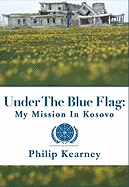February 16, 2012
In 2001, when assistant district attorney Philip Kearney left San Francisco for Kosova, he found himself driven by generous motives: he wanted to help “rebuild” this former Serbian province shattered by a decade of ethnic warfare (4). He would do that rebuilding “under the blue flag” of the UN, serving as a prosecutor of war criminals. But early in his brilliant book bearing the title above, Kearney acknowledges that his selfless wish to help heal the Balkans rooted in personal needs: his mission would help him to squelch the “feeling” that his life “was half over” yet he had not made his “mark” (2). He would fill the “hole” in his life, then, by helping Kosova restore the rule of law.
Early on, Kearney’s mission filled that hole, giving him a sense of “vigor and purpose” that he “hadn’t felt in years” (21). Yet after a year of service in Kosova, where Kearney found the justice system truly in “tatters” (14), one might have forgiven him had he returned to the comforts of San Francisco and written a judgmental book about the cowardice of some Kosovarans who won’t bear witness against murderers and rapists (84), and about the incorrigible corruption of some police and judges: “the same people who were supposed to be upholding the law were the people I needed to go after” (197).
But instead of complaining at home, Keaney stayed to pursue his mission, for the Balkans “had gotten into [his] blood” (224). Having lost himself in Kosovaran stories of suffering and endurance, of courage that sometimes overcomes terror, Kearney no longer had time to worry about making a mark.
Mesmerized by Kosovaran stories, Kearney quickly discovered the hatred—“still very real and still very alive”—that threads through both Albanian and Serbian narratives (39). Those hatreds, now and always, have made “retributive murder…commonplace” in the Balkans, and Kearney found in Kosova “no justice system to reign in the violence” (45). With no rule of law, either during or after the war, Kearney heard stories of Serbian death camps, where Albanian women suffered beatings and rapes daily (159), and of raids on Albanian homes, where rapes in front of family members preceded the lootings (108). Kearney also heard stories of Albanian retribution; one such case involved an Albanian with an AK-47 slaughtering a dozen Serbs, including a four-year-old boy, in front of a store (56). “Nobody here,” Kearney concludes, “has clean hands” (226).
To work toward ending this cycle of hatred and vengeance, Kearney used his Kosovaran courtroom to persuade both sides that “justice had to be blind—especially to ethnicity” (243). Sharing the UN’s commitment to “conquer ancient tribalism and replace it with the rule of law” (256), Kearney argued passionately that atrocities “committed either by military winners or losers” must be prosecuted by one high standard of human conduct, especially when committed “against the civilian population” (257, 259).
Amazingly, Kearney and his legal team won convictions against both Serbs and Albanians. Predictably, however, set-backs followed, like the acquittal of a Serb Kearney thought he had put away (268), and then the 2005 Supreme Court decision that “with the stroke of a pen” reversed “convictions we had fought so hard to achieve” (282). Yet even such reversals, Kearney hopes, persuades Serbs that international tribunals can be fair to “both sides of the conflict” (268).
Looking back on his mission, Kearney stresses two key lessons he hopes that we all take from his narrative: that “good governance takes time,” and that “our need to engage actively in the broader world” remains “stronger than ever” (294, 295).
Additional Links about Kearney
Interview with Philip Kearney, San Francisco Chronicle, March 1, 2009
*Richard Reeves, Daring Young Men: The Heroism and Triumph of the Berlin Airlift - June 1948 - May 1949 (Simon & Schuster; January 5, 2010) ^Geoffrey Robinson, "If You Leave Us Here, We Will Die": How Genocide Was Stopped in East Timor (Princeton University Press; November 16, 2009)

